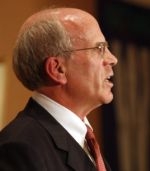 Congressman Peter Welch was elected to his second term with 84 percent of the vote this week. It was an election that the Democrats’ increase their majority in the U.S. House and Senate. Host Bob Kinzel talks with Welch about what kind of working relationship this Congress will have with President-elect Barack Obama.
Congressman Peter Welch was elected to his second term with 84 percent of the vote this week. It was an election that the Democrats’ increase their majority in the U.S. House and Senate. Host Bob Kinzel talks with Welch about what kind of working relationship this Congress will have with President-elect Barack Obama.
Also on Friday’s show, news analysis from VPR’s John Dillon. He’ll look at the take-away lessons from Tuesday’s statewide elections. And we relieve Election Night with a montage of voices, sounds and reaction from around the state.
Listener comments and questions:
Please ask Rep Welch to discuss the need for small
scale distributed renewable energy development, such as local wind, hydro, solar and geo-thermal projects in our towns. He discussed his support of reinforcing the grid so that wind energy could be sent around the country. I am sure he is aware of the enormous amount of wastage in transmitting electricity over long distances, as well as the increase security provided by development of many small projects all over the place. Also, I’m sure he is aware of the great economic development possibilities of distributed energy – jobs to our communities, etc. Can he provide support and encouragement for developing small scale renewable projects. What are some of his ideas about what can be done by Congress?
Susan in South Hero:
I understand the argument for stimulus packages. I would like to hear your reaction to my concern: The federal budget is in the red and we have an unbelievable national deficit. If we feel that reckless borrowing and a huge deficit has caused our current economic crisis, how does congress justify stimulus packages? Doesn’t this exemplify exactly what got us where we
are: spending/borrowing money we don’t really have.
Jon in Royalton:
It is unfortunate that this election didn’t show the disgust that many Vermonters have with Mr. Welch’s vote for the $800 billion bail out, particularly when it included over $100 billion in pork. And we hear that some banks are using the moneys for more bonuses and entertainment junkets. Be careful what you vote for. We are watching.
Kenneth in Middlebury:
I work two jobs, my wife one. We have a young child we are trying to support. We are slowly sinking. The way I see it, bankers and the like got rich off the backs of Main Street. Now you’re considering a small stimulus package to take up some of that burden. My problem is that it seemed so easy to authorize my tax dollars to go to rescue these big companies. How can there be any question at all but to give some of that money back. Would it had made more sense to give a $700 billion stimulus to the people giving paying their taxes, and let them stimulate those big businesses.
Dave:
For the last two election cycles the Democratic strategy has been to campaign against the war and against President Bush. So with that in mind, what is the next strategy that the Democratic Party will use? And specifically what will you be doing to ensure your party promotes bipartisanship?
Bruce in South Burlington:
Is it possible for the government to make "early repayment charges" illegal in these foreclosures so a person could go to their local bank, get a reasonable loan and pay off the original loan that has been sold in pieces to unknown investors?
CJ:
Senator Stafford famously called his no-strings earmark for the Circ Highway the worst mistake he ever made. When Peter Welch talks about waiving state match, alarms should be ringing, red flags waving. There is a good reason to have state and local match for federal aid transportation projects. Local skin must be in the project. There are many dumb projects that have moved along the process of engineering and analysis that do not deserve to be constructed. They sit around on the shelf, failing to meet test for funding. They just sit… waiting. Waiting for what? "Free money." Why? Because each project is initiated by a federal aid agreement requiring that all federal aid be returned if the project is abandoned. A regulatory manifestation of the fallacy of sunk costs, believing that sunk costs have value is one of the worst mistakes that a decision maker can be make. It would be nice if Rep. Welch would pursue elimination of project agreements instead of state match requirements. Then real money could be saved, and future investments could go to the most worthy projects instead of the most "ready" projects.